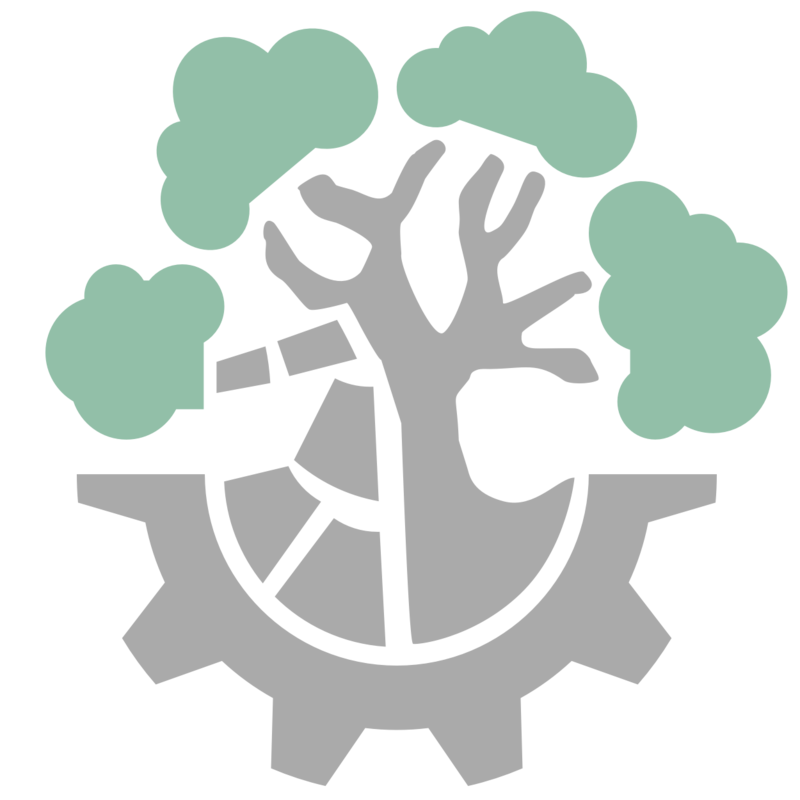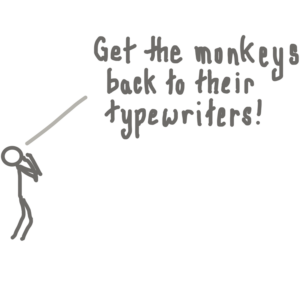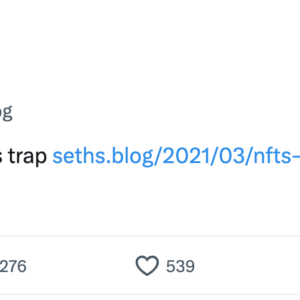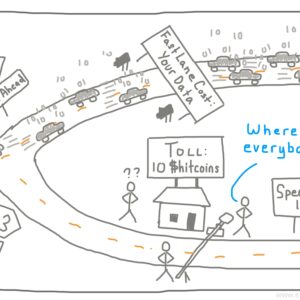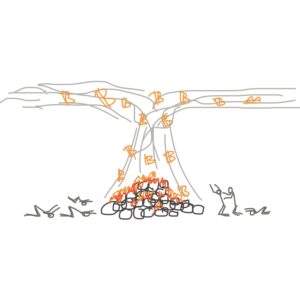How to Fix and Avoid Burnout
Burnout sucks. I'm not talking about that "I can't wait for the weekend" feeling or even the glazed-eye look you gave your parents when returning home from finals week during college. When I refer to burnout, I mean the structural depletion of energy which makes it nearly impossible to raise your head and get real work done. It's a poison that seeps into and sucks the life out of every working minute.

In startup culture, we glorify working ourselves to death in a way which is completely absurd and totally self-imposed. Along my own 5 year rollercoaster building Viking Education, I became intimately familiar with the feeling of burnout. I distinctly remember the numb progression through checklists of tasks that had become divorced of any meaning and putting on a smiling facade which overlaid an inner me who had long since stopped bothering to panic at his lack of excitement for work.
I resolved that, regardless of what I did next, I would never again let that feeling take hold.
To defeat your enemy, you need to understand your enemy.
Burnout is often mischaracterized as being about "overwork" or even conflated with depression. Both of these have strong correlations but miss the point. Burnout is fundamentally about energy balance. Specifically, a long term energy imbalance that leads to a lack of reserves which essentially shuts down your ability to get excited about work.
The Well of Energy
Imagine that you start every day with a well containing some amount of energy. Throughout the day, that well is naturally filled by things which give you energy (great conversations, creative expression, learning, going outside, etc) and drawn down by things which require it (social drama, pointless tasks, bad news, fluorescent lights etc). At the end of the day, you go sleep so you can refill the well for the next morning.
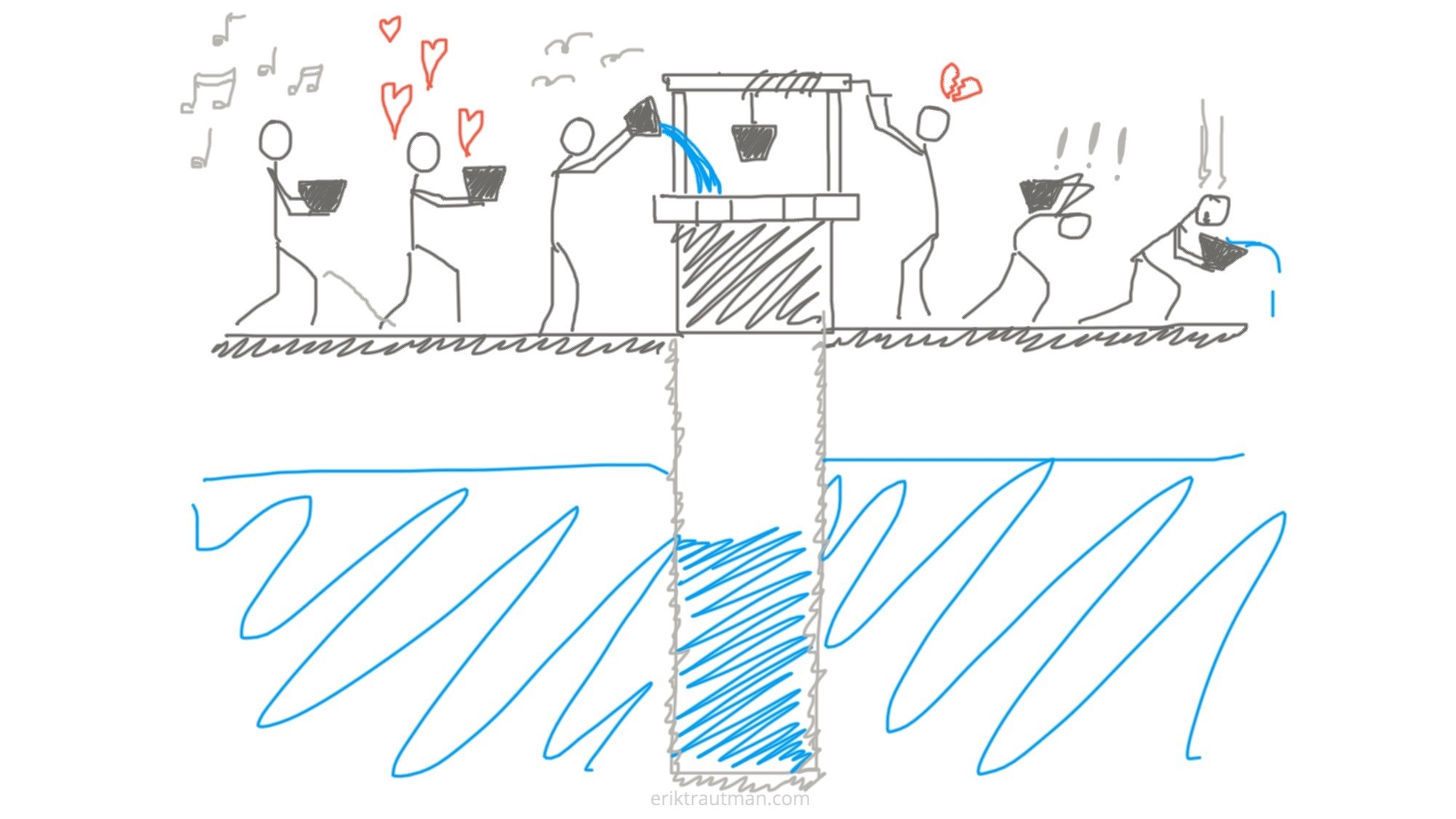
On a daily basis, this is a pretty straightforward way to think about energy balance. Some days you will have to draw down the well quite a bit to get through a bunch of rough news (remove a few buckets) or tough work (remove another few buckets) while others you will end up filling it to the brim with good momentum and good people. When you go to sleep, you wake up to the new day with your well more or less where it started.
Over time, though, the well isn't actually constant. Every night when you go to sleep and the well rebalances, it interacts with the local aquifer (an underground water system). When you have a great day and your well is overflowing, overnight that extra energy seeps back into the local system, raising it ever so slightly.
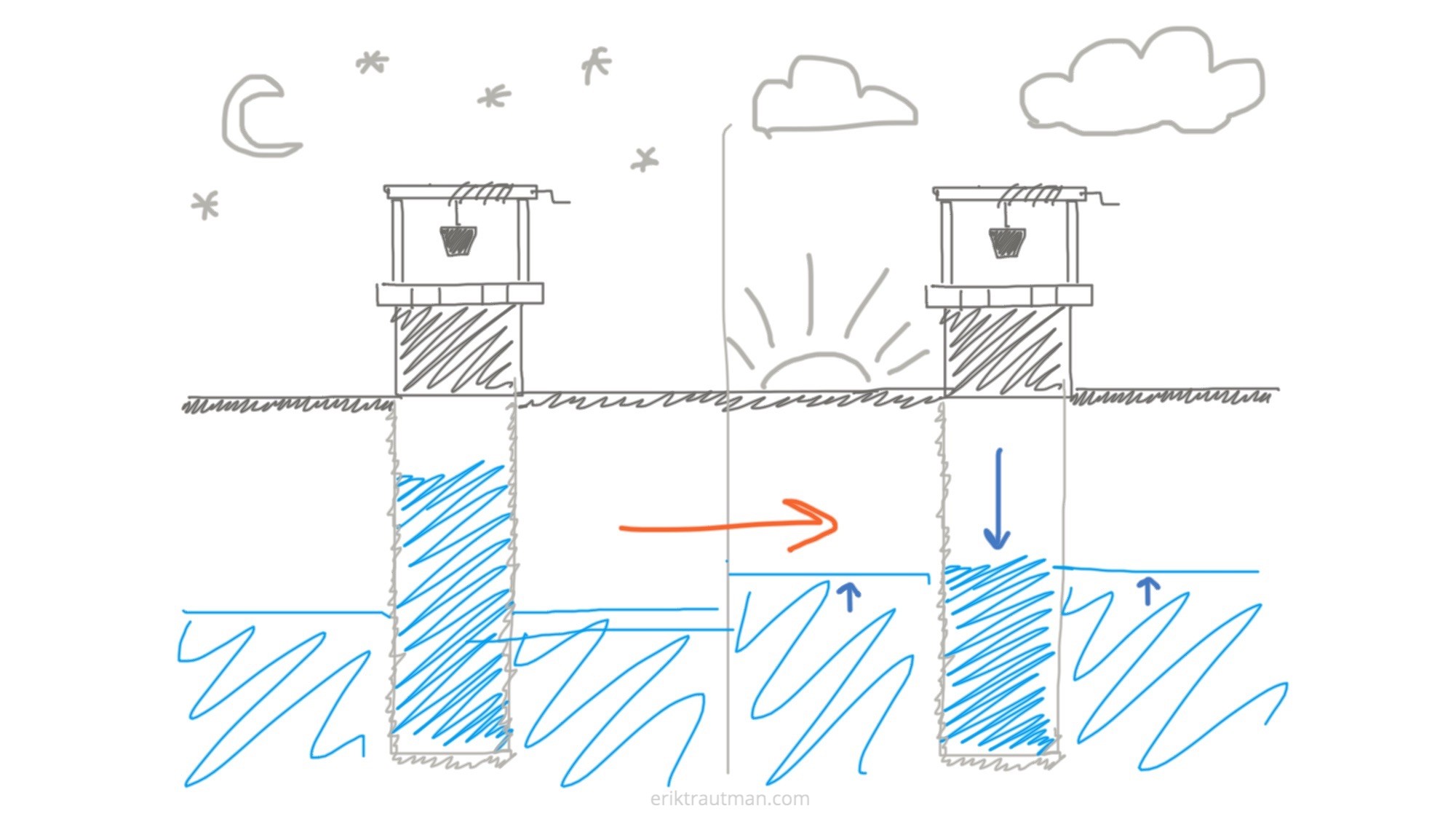
On the flip side, if you have a really tough day and your energy well dries up, during the night it has to draw extra from the local system.
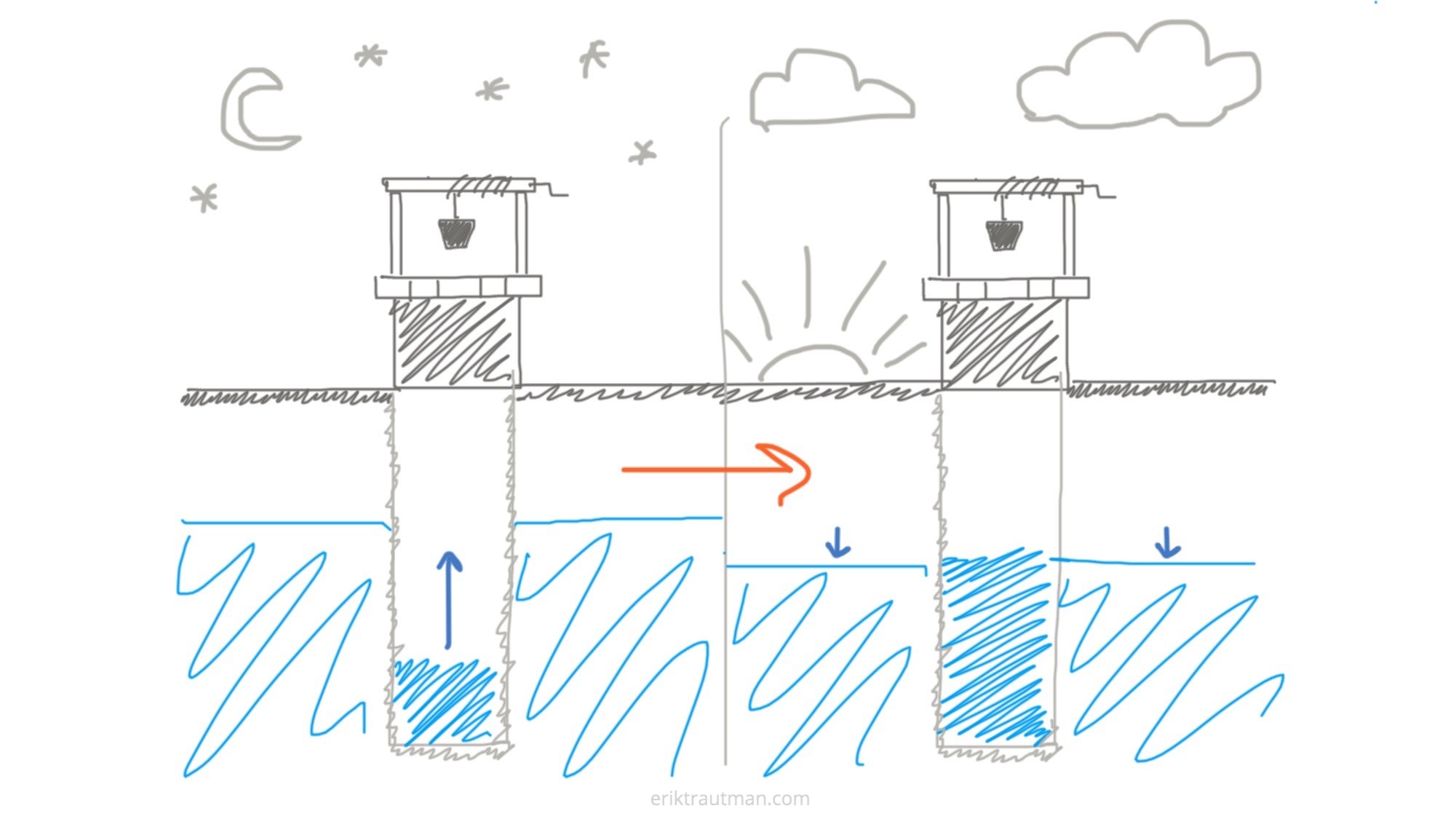
For most people, that's not a problem. The local aquifer is pretty big and it tends to be pretty stable over time. Sometimes you have bad days, sometimes you have good days, and in general things are pretty balanced.
Now imagine that you have a whole long series of tough days where the well got drawn down to the bottom. Every day you may not have noticed the difference but eventually there was less and less energy to draw from and you started each day from a lower and lower point. Eventually, there is so little energy in the system that the well can barely refill at all in the morning and even a few good days can't change that.
Welcome to burnout.
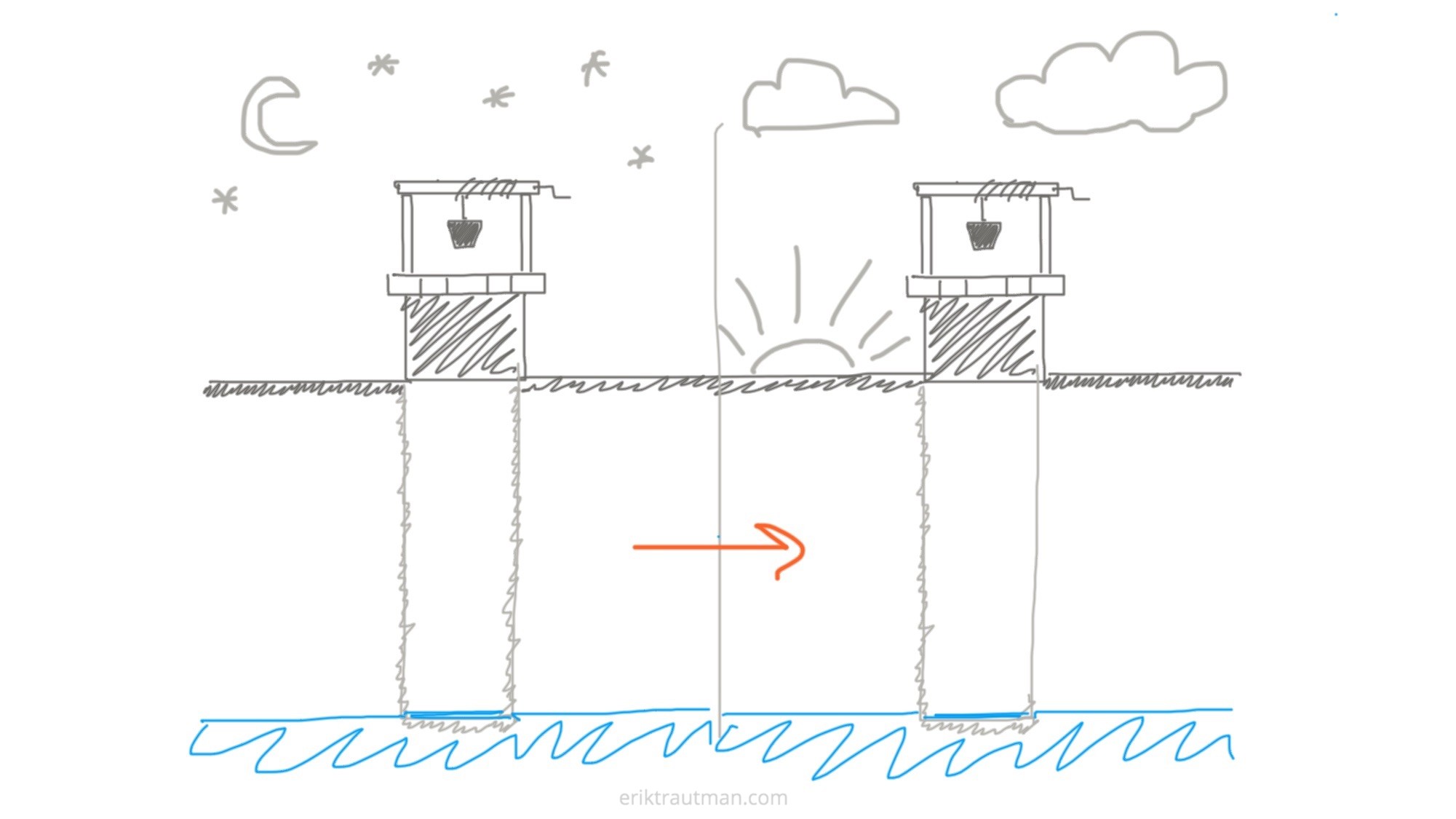
This obviously isn't a scientific analysis of the biochemical markers affecting the human psyche but it should provide a much more practical framework for addressing the issue. Essentially, once we figure out how to affect the energy balance of the system, we can fix the imbalances.
There are obviously two ways to shift the balance of energy here:
- Get your daily well roughly into balance
- Figure out how to bring more energy into the system overall
This starts with an understanding of what gives you energy versus what costs you energy. This may not be something you've thought of before but it's incredibly important.
Figuring out your Daily Well
Start by drawing two columns on a sheet of paper and list out all the things you did last week. Put those things which gave you energy on the left column and those which cost you energy on the right column.
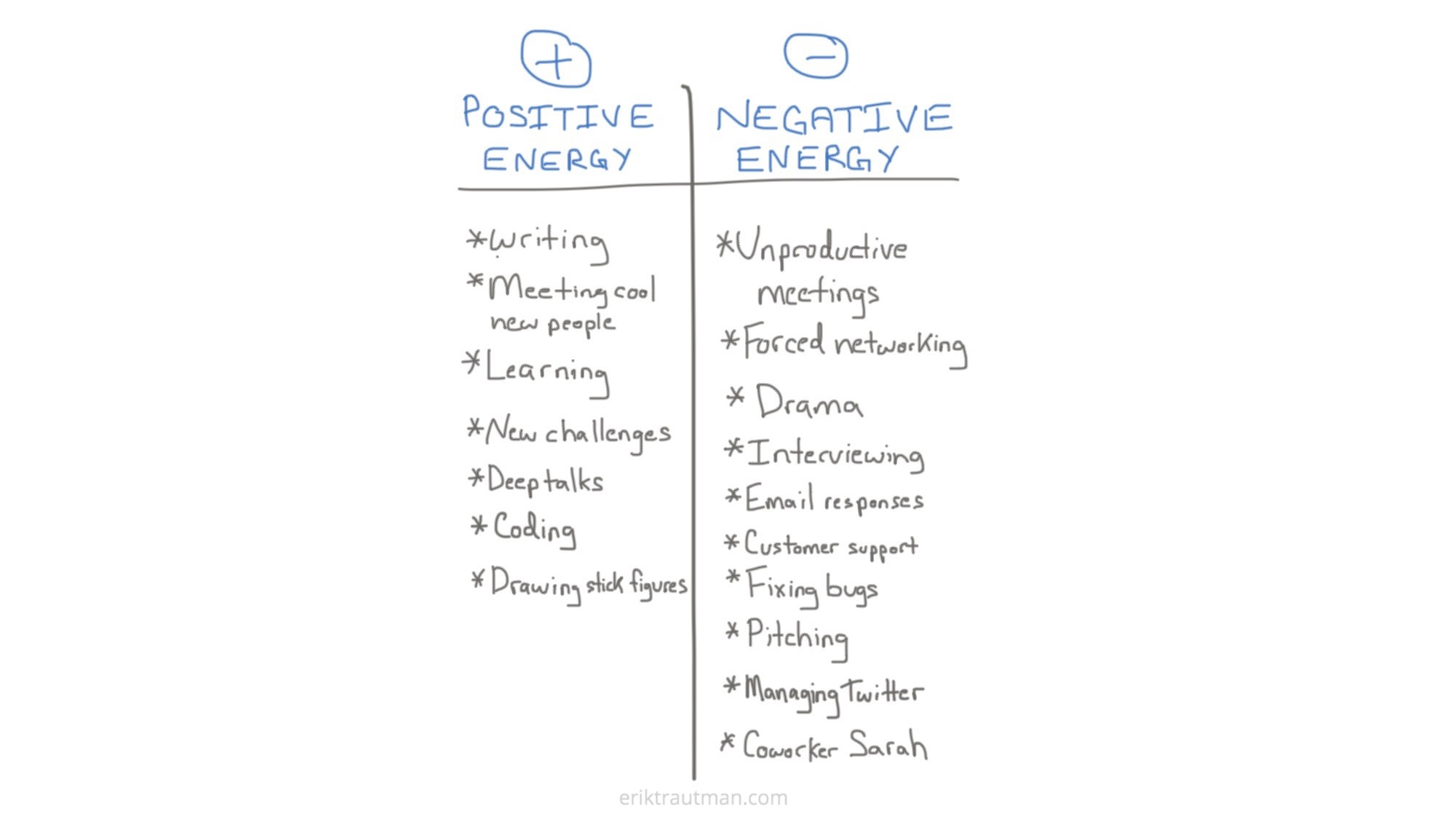
If you've spent some time doing mindful self analysis, this shouldn't be too hard but you'll probably learn a few things along the way regardless. For most people, especially those in the thick of work, it can be daunting to see how many things you do which end up costing you energy.
Obviously some things cost more energy than others and some things give you more energy than others. For now, the point is to look at them side by side and think about that balance. Specifically, think about how you can (on average) finish each day with a net positive gain in energy instead of an empty well.
For me, that means giving myself time to create, time to learn and/or time to have interesting conversations with interesting people. These are all things which tend to be fuzzy and hard to calendar so I often ended up filling my work days with easily quantifiable tasks that ultimately cost me energy.
You will probably be different in the details but, if you're reading this, I suspect you can identify a number of things to lean into more and, especially for leaders, a number of things to reduce or delegate to others.
Your best indicators of energy add are "flow states". This is where you operate at the edge of your abilities to accomplish interesting tasks while time just flies by.
Your best indicators of energy loss are "circling anxiety states". These are times where time seems to crawl forward and you are using far more mental energy than the task should take. More tellingly, this mental overhead often bleeds forward into other tasks and may even keep you up at night with circling thoughts.
The key here is balance. Not "balance" where you need to have X hours for work and Y hours for "fun". I certainly don't ascribe to that philosophy. But balance of energy is different — you might be able to get a lot of energy from working in a flow state but lose it from going to a party with a high social energy cost. It will be unique to you.
Figuring out your Aquifer
Addressing the balance of your energy well is an important start but doesn't finish everything. The system itself is also one you can influence.
For example, remember a whole week when you woke up each day full of energy and excitement? Why was that?
The health of your energy aquifer is what actually matters long term. The best way to address it over time is to make sure your daily well isn't drawing down too much but there are other things you can do to directly influence it.
The health of your aquifer is generally a result of how well aligned your lived life is with your inner self and values. For example, when you are operating with "meaning" or driving towards what you consider to be your "life purpose", then it's like a gentle rain is adding energy back into the system constantly over time. The same is true for being in love or feeling exceptionally connected to a tribe of people.
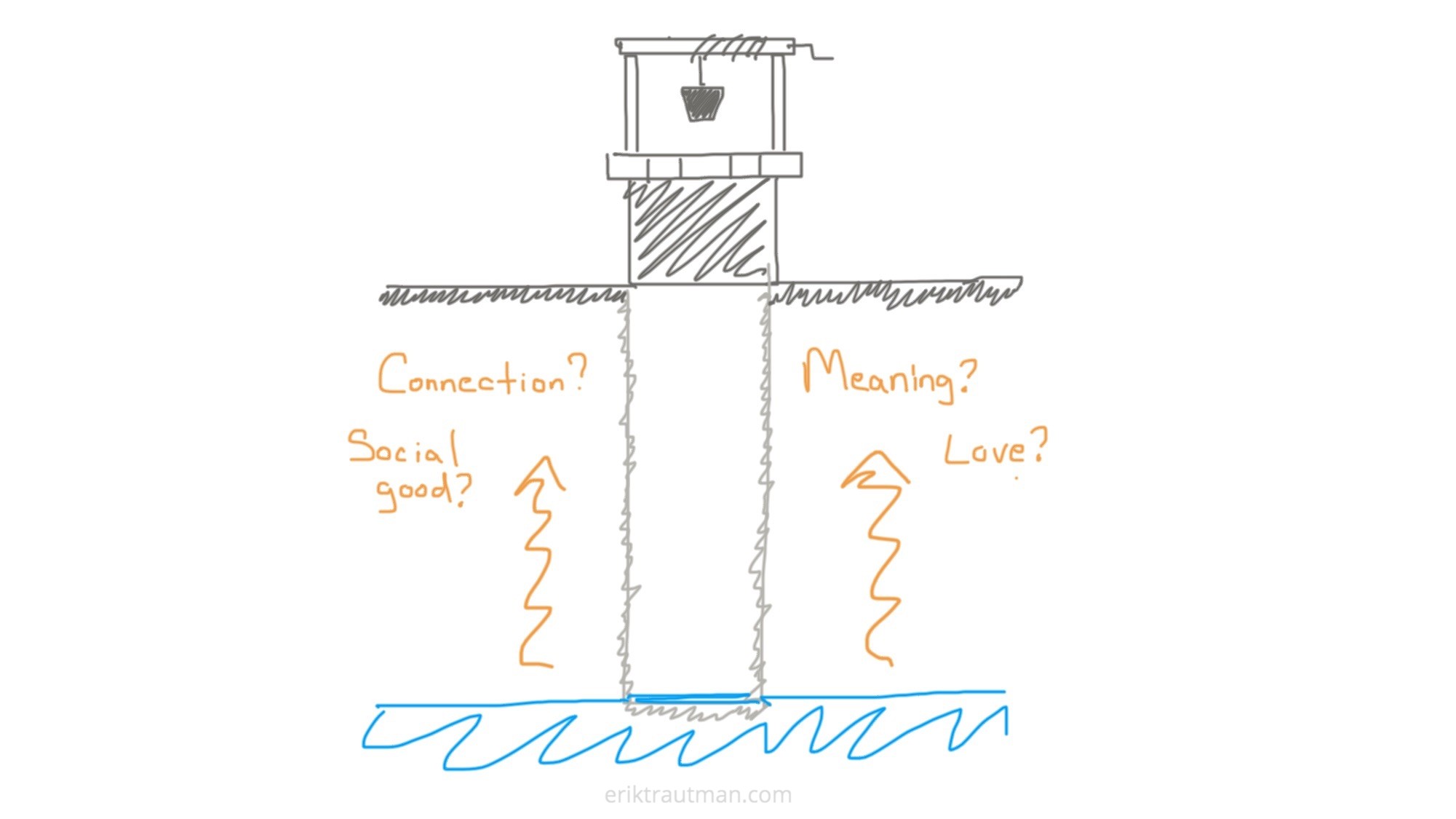
On the reverse, if you know deep down that what you are doing doesn't align well with your values, it's like a drought that slowly pulls that energy right out of the ground and makes it harder and harder over time to refill the well. This can also come from feelings of loneliness or loss.
So, just like before, dig in a bit. Write down what factors on a long term basis give you a sense of meaning, purpose, connection or value and which are in direct opposition to that.
Addressing Burnout
Let's say that you're deep into burnout, meaning that your aquifer is so low it's barely giving any energy to your daily well. How can you fix this?
It starts and ends with figuring out what gives you energy on a daily basis and what gives your system energy on an ongoing basis. When these are both in alignment, you've achieved the rare "life flow" state where everything just seems to keep working out because you're exuding so much energy.
The same factors which get you to "life flow" will help cure burnout as well.
First, though, you need to make two acknowledgements:
- Something needs to change. You're in burnout for a reason and you can only get out by changing something in your life. If you return to the exact same environment, the same issues will come up again.
- It takes time. Refilling your aquifer so your daily well can get healthy again is a slow process. A week-long vacation only begins to scratch the surface.
That's one of the key differences between burnout and overwork. If you have just been working too hard, a vacation can help you reset the short term imbalance. But if you've been operating in a state of depletion caused by both macro misalignment and daily imbalance, it won't be enough.
Essentially, if you hate your job because it doesn't fit your values or give you meaning, it will take more than a vacation to address your overall imbalance. You need to either finish your days very strong by doing lots of energy-granting activities (maybe shifting your role at work to be one you enjoy) or rebalance your macro picture (maybe by switching to a company doing things you actually value).
The same magnitude of change is true if you love the idea behind your job but the daily relationships or tasks suck the life out of you over time. You can only hang onto an idea of "mission" or "purpose" so long in the face of endless adversity. Ask anyone working at a chaotic nonprofit or in a difficult area of social work, for example, how hard it is to find that right balance.
My Case
In my case, it took roughly 3 months after selling the company to regain my fully normal state. My daily well became net positive when I was able to:
- Learn about new challenges that I could actually pursue now.
- Get out of the building and meet new people again where before I'd been so deep in my role that I hadn't nurtured enough new relationships.
- Take the time to start writing again.
- Take the time to travel and explore.
My system's macro health also improved when I shifted from an environment that wasn't challenging me and didn't offer freedom or new relationships to one where I could freely pursue new challenges and meet new people.
The Rest is on You
If you can just figure out what grants and what costs you energy, you're well on your way to understanding and, ultimately, avoiding or fixing burnout. It's a crappy state to be in but it is solvable. Sometimes it takes a lot of listening first so you can figure out what actually does affect your energy balance.
The framework helped me fix the chronic burnout I developed over 5 years and it has given me the confidence to pick an opportunity which will keep me in alignment with what I need to avoid hitting burnout again. Just the power of knowing that is a huge weight lifted off my shoulders. I hope it will be for you as well.
